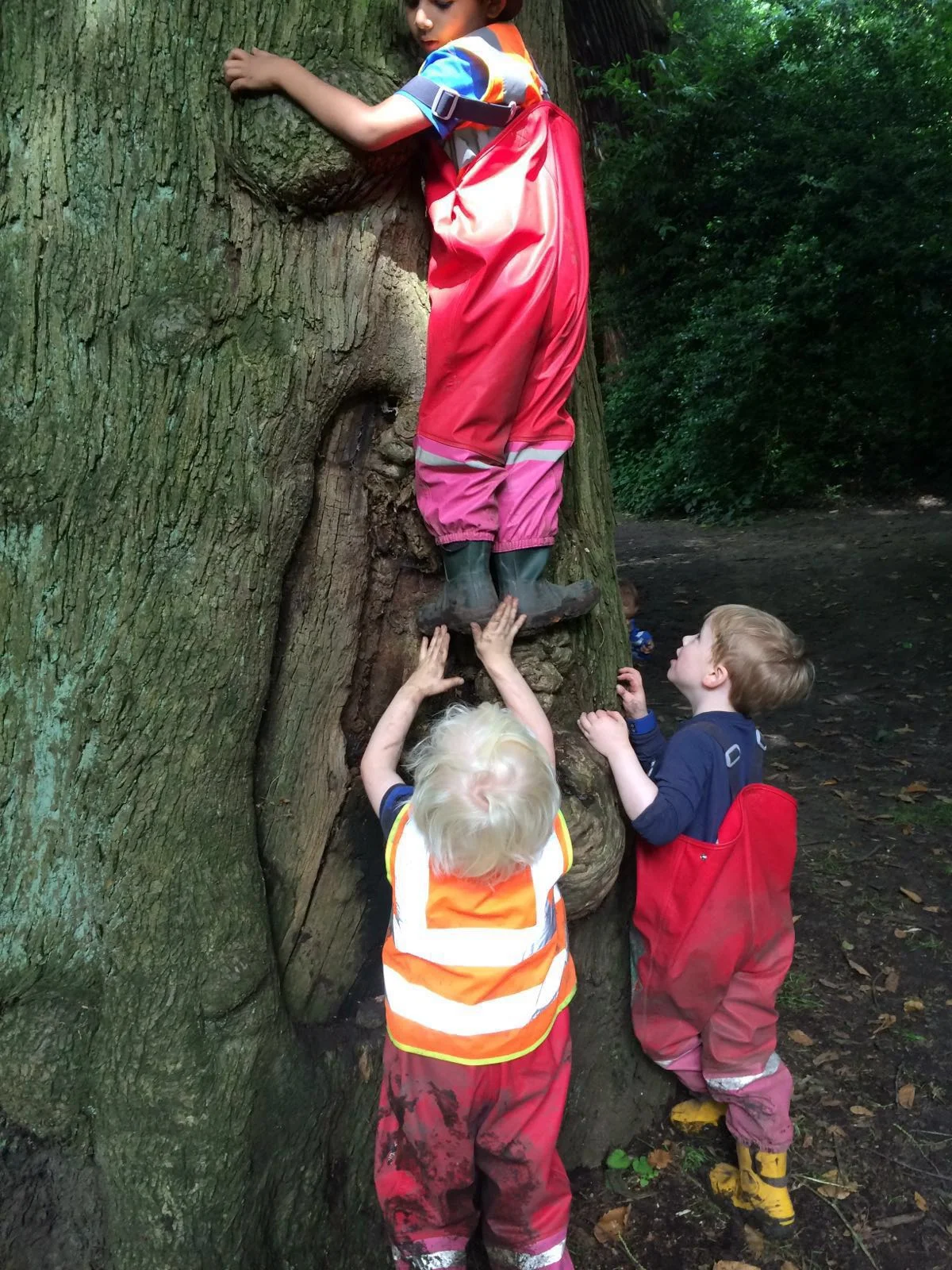We are such a risk averse society today. Often children are wrapped in cotton wool to ensure they come to no harm, but this also denies them the opportunities that risky play and behaviour provide to learn and develop. Helicopter parenting has become the norm, seriously reducing the freedom children have to play freely.
Outdoor play in our forest offers a wealth of opportunities for naturally risky play. When we decide upon an action or a boundary in the forest, as important as deciding what we don’t want to happen is figuring out what we do want for our children.
“We want our children to grow up with resilience, to be independent, to be confident, to be problem solvers.”
We want to demonstrate our faith in them to build up their confidence that they can trust their own judgements in life. We want to acknowledge their capability for managing their own risk, we want to teach them to bounce back from failure and we want them to challenge themselves whilst exploring boundaries. We want our children to feel the joy of freedom, to encourage their creativity and enhance their adaptability.
We believe these long term goals to form strong personal characteristics and abilities to help navigate life are of vital importance. We obviously don’t want our children to come to harm but we have to take a risk-benefit assessment to analyse how we can manage risks associated with children’s playful behaviour whilst avoiding children missing out on some highly beneficial learning through this play.
The forest offers endless opportunities for risky play, all of which takes place under the close supervision of our practitioners. The relationships between our children and our adults form a very important role in risky play as of paramount importance is that our children feel comfortable and secure enough to embark upon risky play in an environment which enables this play.
Of equal importance is that our excellent practitioners understand the importance of allowing risky play and who work hard to make risky play accessible to all ages. Sometimes it’s with encouraging words, sometimes it’s by asking the children to support each other. Some of our favourite moments in the forest have been witnessing incredible collaboration and social skills whilst a group of 2-3 year olds motivate each other to climb to the top of a tree:
“There, that’s it! Hold on there! Now move your foot there. You can do it!”
A group of 2-3 year olds motivate each other to climb to the top of a tree
At other times it can be by simplifying an activity, such as proposing a lower branch as a goal for the climb to boost confidence. At all times practitioners are constantly assessing and ready to jump in if required.
In every aspect of play we try to use the motto:
“I can help you with my words but not my hands”
To try and edge the children towards learning to problem solve, assess risk and build up their resilience. When our children want to climb a tree, they judge for themselves the strongest footholds, the safest route and they climb up unassisted, arriving at the top beaming and full of pride. If they want help in getting back down, we use our words and not our hands as we want to assure our children that they can do it.
We want to encourage self belief and confidence. And if there’s anything they can’t do, we use the power of ‘yet’. They can’t do it YET. Failure can offer a wealth of learning opportunities, such as how to best approach the challenge the next time. The excitement and pride of successfully climbing a tree unassisted for the first time is a wonderful thing to see in a young child.
We have faith in our children. They are amazing and we trust in their capabilities. We are regularly astounded at their abilities and rewarded for our faith by observing the children reminding each other how to be safe in the forest. ‘When we are carrying tools, we carry them like this, and we always wear a safety glove’, ‘You are near the boundary ribbon, look! We can’t go past there without an adult’ and much more.
We recently put a go-pro camera on the children for a day as we wanted to watch to see what the children are experiencing rather than what we think they are experiencing. We saw lots of fantastic play and an incredible amount of self and peer to peer regulation. Allowing children to monitor and assess their own and their peers risky play is teaching them extremely valuable life skills.
Children are designed to learn emotional resilience through engaging in risky play. They need to encounter fear to learn how to manage it. If we deny our children the opportunity for risky play then we also deny them the opportunity to bolster their mental health.
Let's give children more freedom. Take them outside. Let them climb a tree. Encourage them with words rather than your hands. And revel with them in the thrill of success when they reach the top.


